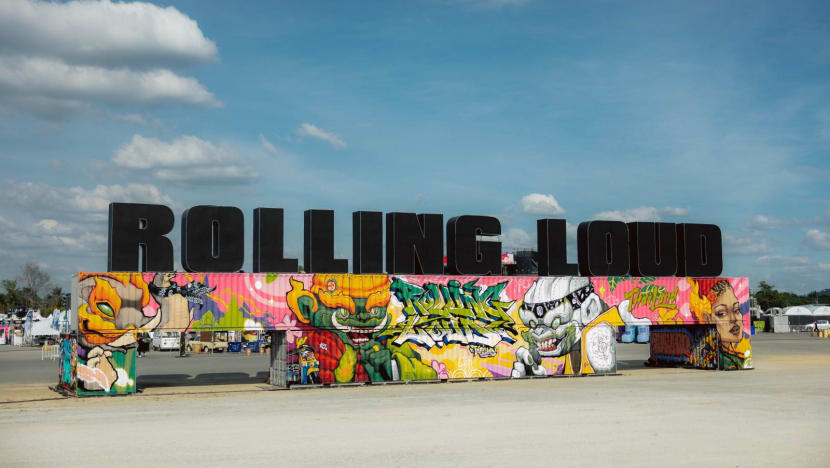Thailand’s music festival boom: Why global mega-events are finding a new home in Asia
Large-scale music festivals are facing headwinds elsewhere but finding a new base in Thailand, as the country tries to boost its tourism sector in a region ready to party and spend.

DJ Snake performs at Rolling Loud Thailand in Pattaya in 2024. (Photo: Rolling Loud)

This audio is generated by an AI tool.
BANGKOK: It was a Monday night, but the British deejay Fred Again sure made Bangkok feel like it was still the weekend.
Last month (Jul 21), thousands in the Thai capital packed into UOB LIVE, a new entertainment venue, as he put on one of his characteristically energetic shows complete with world-class lighting and sound.
The crowd included “gig trippers” - music fans who plan their travel around concerts and festivals - from Southeast Asia and countries like China, India and Pakistan.
Fred Again was the type of trendy headliner that Bangkok residents might have sat back and watched only tour Japan, Singapore or Australia in years gone by.
But as he jumped off the stage, bassline thumping, and ran through a dense crowd lit up by shimmering neon, it was clear that Thailand had found its place as an emerging player in the live music scene.
Even as large-scale music festivals face headwinds in mature markets like the United States and Australia, where multiple events have been shut down this year, Thailand has been packing its gig calendar.
This month, Thailand’s Cabinet approved an agreement to host the Belgian electronic dance music festival Tomorrowland for five years from 2026, a headline-grabbing deal for an event that could draw a million people by 2030.
Tomorrowland, known for its fantastical design and creative themes, joins a raft of some of the biggest music festivals in the world being hosted by the kingdom.

Super Sonic Bangkok, held last weekend, was the most recent and boasted a line-up of top global artists including Black Eyed Peas and Camila Cabello.
More is to come. In November, international hip-hop festival Rolling Loud is set to hold its third annual edition in Pattaya. Electronic music events 808 Festival and UK-based Creamfields are taking place in Bangkok in December, while Phuket will host the Electric Daisy Carnival Thailand in January.
Over the next year, Mariah Carey, BLACKPINK, Jackson Wang, Doja Cat and Guns N' Roses will play standalone concerts in Bangkok.
“The music festival scene in Thailand is currently on the rise. The region is cementing its place as a new hub in the global festival landscape,” a spokesperson for Live Nation Tero, the local promoter of Creamfields Asia, told CNA in a statement.
Thailand has bet on mega-music festivals and high-profile live entertainment events to help cement its place as Asia’s new global stage and reap the tourism and economic benefits that could follow, according to Gary Bowerman, a tourism policy and consumer trends analyst.
“Thailand is serious about investing significant sums into its live performance economy, and is capable of securing major global franchise events,” he said.
The Thai government will spend over 2 billion baht (US$61.5 million) to host Tomorrowland, according to Sorawong Thienthong, the minister of tourism and sports.
“The challenge now is to leverage that investment to boost both domestic and inbound tourism – and expenditure,” Bowerman said.
The country’s tourism industry remains lacklustre. It is set to miss its target of 39 million foreign arrivals in 2025, a number just shy of the 2019 peak of 39.8m. The country recorded 19.3 million foreign tourist arrivals in the first seven months of 2025, 6 per cent below the same period last year.
With its international tourism industry dipping, Thailand is doubling down on a “quality over quantity” gameplan with a focus on higher-spending visitors, the likes of whom might see music festivals as a reason to visit the kingdom.
“It has publicly supported the growth of the festival industry as part of its ‘soft power’ strategy, aiming to boost tourism revenue and the local economy,” said Live Nation Tero’s spokesperson.
“This supportive environment creates a stable and favourable climate for large international events,” the spokesperson said.

CHECKING BOXES AND BUCKET LISTS
The global live music market is projected to grow from US$28.1 billion in 2023 to US$79.7 billion by 2030, based on data from Research and Markets, a market insights and analysis group.
One of the main drivers is the rising consumer preference for live, in-person experiences over material goods, which has led to a surge in ticket sales for concerts, music festivals and exclusive performances, the report said.
Consumers, especially millennials and Gen Z, are prioritising shared experiences “that provide personal enrichment and social connection”, it found.
Beyond the projected growth of the live music market, global events tourism is also set to increase by 4.6 per cent per year over the next decade, according to a report by Market Research Future.
Governments and tourism organisations are central to that growth, the research firm found.
Thailand, too, has focused on seizing those opportunities. The Tourism Authority of Thailand’s (TAT) umbrella campaign called “Amazing Thailand Grand Tourism & Sports Year”, for example, prioritises high-profile events like Tomorrowland and Formula One.
“These events provide unparalleled global marketing exposure, showcasing Thailand's sophisticated infrastructure and hospitality capabilities,” said Nithee Seeprae, TAT’s deputy governor for marketing communications.

It has looked to package its natural attractions and other drawcards as a tourist destination with incentives and intangibles like lower production costs, the lack of an entertainment tax, strong fan culture and visa-free travel.
“Thailand checks so many boxes when selecting an international location – it's a sought-after travel destination with amazing energy, nightlife and culture that’s easily accessible to fans across Asia and beyond,” said Matt Zingler, the co-founder of Rolling Loud.
Craig Grossarth, the general manager of UOB LIVE, added that a multitude of factors, like strong purchasing power, hospitality infrastructure and an increasing number of high-quality venues, are making Thailand a “key stop in Asia” for touring artists and music lovers alike.
“Fans can combine a bucket-list concert with a holiday — something that’s hard to resist,” he said.
Rising disposable income in Asia is also making the region more lucrative for promoters to bring in big-name international acts, the Live Nation Tero spokesperson said.
Thailand stands out in the region with a policy focus, reputation and infrastructure that most of its neighbours cannot realistically compete with, Bowerman said.
Only three countries in the region would be in the market – in terms of political will and financing – for such festivals: Thailand, Singapore and Vietnam, he said. That is aside from the broader region where live music tourism is scaling up with China, Japan and South Korea enjoying growth in their festival economies.
“Whether these festivals can help differentiate Thailand’s visitor base depends very much on the festival line-ups, and how the TAT can promote differentiation for its live events,” he said.
The success of Singapore wooing Taylor Swift to play six exclusive shows last year - a move that the Monetary Authority of Singapore (MAS) indicated could have generated tourism receipts of up to S$450 million - was a clear impetus for the Thai government to follow this path, he said.
“Thailand securing Tomorrowland is a direct outcome of missing out on Taylor Swift. The disappointed, and very public, response of then-Thai Prime Minister Srettha Thavisin signalled that competition to attract A-list stadium concerts and festivals would accelerate,” Bowerman said.

Given the taxpayer dollars used for events like Tomorrowland, the government will be heavily leveraging its private sector partners like hotels, airlines, travel agencies, consumer brands and banks to spread the marketing load and incentivise as many potential visitors as possible, Bowerman added.
“As the Asia-Pacific concert calendar becomes more crowded, travellers will have more choices and will be selective about which ones they attend,” he said.
It plays into fears that local players in the festival business already have about Thailand hosting too many events, and levels of demand that are too low to accommodate them all.
A BUBBLE READY TO BURST?
Music festivals are not a sure bet. Mature markets especially are enduring a festival crisis of sorts - at least 95 events have been cancelled this year across the world, many of them in the US, Europe and Australia, based on tracking by the website Music Festival Wizard.
The cancellations have been blamed on rising costs, slowing ticket sales and consumers showing more discernment about which events to attend.
But Thailand - and international event promoters - seems to be wagering that where others stumble, it can succeed.
Thailand is seeing more events being held than ever, but demand may not be keeping up, said Sarun Pinyarat, the founder and chief executive of music promoter Fungjai, based in Bangkok.
Thailand cannot expect to be an exception, he argued.
It has him questioning whether Thailand is actually building a viable regional or global capital of music festivals or setting itself up for a bubble. Behind the business are serious concerns about sustainability, competition and whether local festivals can survive.
“We are in a state of bubbling in terms of live events. There is a lot happening right now,” he said, explaining that there are about 300 music events, big and small, held in Thailand annually right now.

In the wake of COVID-19, new festival promoters from a range of industries, even from outside the music business, emerged in Thailand. This coincided with more young people going to music events regularly, especially in Bangkok, after years of pandemic lockdowns and restrictions.
But according to Sarun, demand does not match supply right now and it has already spelled trouble for many in the business. Those without strong customer bases will struggle in the years to come, he predicts, as more international promoters eye Thailand as well.
“There will be a lot of people losing money, and they'll start to realise that, 'Okay, we shouldn't be entering this arena to begin with', and it's going to slow down a little bit,” he said.
“We have already started to see some festivals that happened once and never happened again," he said, citing Waterbomb Festival and River Fest Music Festival as examples.
Inflation in production and artist fees are already limiting the types of line-ups smaller festivals can offer. Sarun says those costs have doubled in many cases since before the pandemic, but ticket prices have barely budged due to competition for sales.
This year, the music festival he co-founded - Maho Rasop festival - which has attracted international bands like Interpol, Air, King Gizzard & The Lizard Wizard and the Vaccines since its inception in 2018, will not be held.
Rising costs have forced them to take a step back to try and make sense of the industry landscape, said Pimporn Metchanun, co-founder of the festival.
“It's difficult for us to compete. And … if we were a new festival or would like to start something this year or next year, I think it would be very difficult,” said Pimporn, who is also co-founder of HAVE YOU HEARD?, a music management and promotion company in Bangkok.
“It was really intense these past few years, really.”

The saturated local scene is not putting off the international competition, however.
“At present, we believe Thailand is in a sweet spot where supply and demand are well-balanced,” said Grossarth.
For Creamfields’ organisers, the trend is a positive sign of the country's rising status as a music hub, which in turn will drive better experiences for festival-goers, offer exposure to local and regional performers and improve production quality.
“More festivals mean more economic opportunities and a stronger cultural scene. We see it as healthy competition,” the spokesperson said.
For an emerging market, more chances for people to experience high-quality live music will increase the size of the bucket for everyone, said Tariq Cherif, co-founder of Rolling Loud.
It has had its troubles in Thailand, with a group of more than 10 event contractors filing a police complaint against the organisers of Rolling Loud Thailand 2024 for defaulting on 20 million baht (US$615,000) in wages.
Cherif, as co-CEO of the company, said he is confident in the long-term growth of Rolling Loud Thailand.
The same faith in the fast-moving industry is not shared by the likes of Sarun and Pimporn, who see government money being channelled to foreign promoters while locals, who are designing grassroots experiences for Thais, are left behind to wallow.
“We barely have any help. There are so many really creative and very genuine local festivals that could go much further with government support,” said Sarun.
Pimporn is happy to watch from the sidelines for now as her company recalibrates how to navigate the current situation. As a Thai, she laughed and admitted she was used to uncertainty.
“Throughout my life, I feel like things come and go all the time in Thailand. Like, nothing lasts long because of the political situation or the economy,” she said.
“I don't know. This time, I can't predict what will happen.”




















